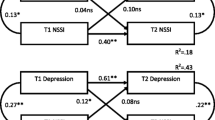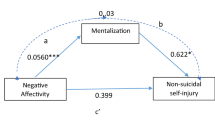Abstract
Adolescent non-suicidal self-injury (aNSSI) is associated with abnormal scores on personality traits, such as high neuroticism. However, no studies to date have examined personality facets of self-injury in a cohort younger than college-age. Plus, adolescent psychopathologies, especially Depressive Disorders, are associated with a similar personality profile and are highly comorbid with aNSSI. Consequently, it remains unclear whether personality provides insights about aNSSI in youth beyond that due to underlying psychopathology. 550 community-dwelling 13- to 15-year-old never-depressed adolescent girls were interviewed for lifetime aNSSI and lifetime psychopathology. Personality traits, broad domains and specific facets, were assessed by self-report. Never-depressed adolescent girls who endorse aNSSI often met lifetime criteria for psychiatric disorders (NSSI: 20/43; 46.5% vs. non-aNSSI: 131/507; 26.1%). aNSSI and lifetime psychopathology were each independently associated with several traits (e.g., high neuroticism and conscientiousness), whereas some traits only discriminated aNSSI (e.g., high melancholia, a facet of neuroticism related to sadness and negative self-evaluation) or lifetime psychopathology independent of each other (e.g., low positive emotionality; low agreeableness). Furthermore, a multivariate model identified high melancholia, high openness to experience, and low conscientiousness as incrementally independent correlates of lifetime aNSSI over and above psychiatric illness. Proneness to melancholia, interest in new things, and poor self-control incrementally track aNSSI in never-depressed adolescent girls. Importantly, this emerges early in course (13–15 years of age) and is independent of lifetime psychiatric diagnosis. Implications for updating etiological models and clinical utility of personality assessment are discussed.
Similar content being viewed by others
References
American Psychological Association. (2013). Diagnostic and statistical manual of mental disorders: DSM-5 (TM) (5th ed.). Arlington: American Psychiatric Publishing Inc.
Asarnow, J. R., Porta, G., Spirito, A., Emslie, G., Clarke, G., Wagner, K. D., et al. (2011). Suicide attempts and nonsuicidal self-injury in the treatment of resistant depression in adolescents: findings from the TORDIA study. Journal of the American Academy of Child & Adolescent Psychiatry, 50(8), 772–781. https://doi.org/10.1016/j.jaac.2011.04.003
Baetens, I., Claes, L., Onghena, P., Grietens, H., Van Leeuwen, K., Pieters, C., et al. (2014). Non-suicidal self-injury in adolescence: a longitudinal study of the relationship between NSSI, psychological distress and perceived parenting. Journal of Adolescence, 37(6), 817–826. https://doi.org/10.1016/j.adolescence.2014.05.010
Baetens, I., Claes, L., Onghena, P., Grietens, H., Van Leeuwen, K., Pieters, C., et al. (2015). The effects of nonsuicidal self-injury on parenting behaviors: a longitudinal analyses of the perspective of the parent. Child and Adolescent Psychiatry and Mental Health, 9, 24. https://doi.org/10.1186/s13034-015-0059-2
Bentley, K. H., Cassiello-Robbins, C. F., Vittorio, L., Sauer-Zavala, S., & Barlow, D. H. (2015). The association between nonsuicidal self-injury and the emotional disorders: a meta-analytic review. Clinical Psychology Review, 37, 72–88. https://doi.org/10.1016/j.cpr.2015.02.006
Bienvenu, O. J., Samuels, J. F., Costa, P. T., Reti, I. M., Eaton, W. W., & Nestadt, G. (2004). Anxiety and depressive disorders and the five-factor model of personality: a higher- and lower-order personality trait investigation in a community sample. Depression and Anxiety, 20(2), 92–97. https://doi.org/10.1002/da.20026
Bresin, K., & Schoenleber, M. (2015). Gender differences in the prevalence of nonsuicidal self- injury: a meta-analysis. Clinical Psychology Review, 38, 55–64. https://doi.org/10.1016/j.cpr.2015.02.009
Briere, J., & Gil, E. (1998). Self-mutilation in clinical and general population samples: prevalence, correlates, and functions. American Journal of Orthopsychiatry, 68(4), 609–620. https://doi.org/10.1037/h0080369
Brown, S. A. (2009). Personality and non-suicidal deliberate self-harm: trait differences among a non-clinical population. Psychiatry Research, 169(1), 28–32. https://doi.org/10.1016/j.psychres.2008.06.005
Bureau, J. F., Martin, J., Freynet, N., Poirier, A. A., Lafontaine, M. F., & Cloutier, P. (2010). Perceived dimensions of parenting and non-suicidal self-injury in young adults. Journal of Youth and Adolescence, 39(5), 484–494. https://doi.org/10.1007/s10964-009-9470-4
Buss, A. H., & Perry, M. (1992). The aggression questionnaire. Journal of Personality and Social Psychology, 63(3), 452–459. https://doi.org/10.1037/0022-3514.63.3.452
DeYoung, C. G., Grazioplene, R. G., & Peterson, J. B. (2012). From madness to genius: the openness/intellect trait domain as a paradoxical simplex. Journal of Research in Personality, 46(1), 63–78. https://doi.org/10.1016/j.jrp.2011.12.003
Fikke, L. T., Melinder, A., & Landro, N. I. (2011). Executive functions are impaired in adolescents engaging in non-suicidal self-injury. Psychological Medicine, 41(3), 601–610. https://doi.org/10.1017/S0033291710001030
Gamez, W., Watson, D., & Doebbeling, B. N. (2007). Abnormal personality and the mood and anxiety disorders: implications for structural models of anxiety and depression. Journal of Anxiety Disorders, 21(4), 526–539. https://doi.org/10.1016/j.janxdis.2006.08.003
Goldstein, A. L., Flett, G. L., Wekerle, C., & Wall, A. M. (2009). Personality, child maltreatment, and substance use: examining correlates of deliberate self-harm among university students. Canadian Journal of Behavioural Science/Revue Canadienne des Sciences du Comportement, 41(4), 241–251. https://doi.org/10.1037/a0014847
Gromatsky, M. A., Waszczuk, M. A., Perlman, G., Salis, K. L., Klein, D. N., & Kotov, R. (2017). The role of parental psychopathology and personality in adolescent non-suicidal self-injury. Journal of Psychiatric Research, 85, 15–23. https://doi.org/10.1016/j.jpsychires.2016.10.013
Hankin, B. L., & Abela, J. R. Z. (2011). Nonsuicidal self-injury in adolescence: prospective rates and risk factors in a 2 1/2 year longitudinal study. Psychiatry Research, 186(1), 65–70. https://doi.org/10.1016/j.psychres.2010.07.056
Jacobson, C. M., & Gould, M. (2007). The epidemiology and phenomenology of non-suicidal self-injurious behavior among adolescents: a critical review of the literature. Archives of Suicide Research, 11(2), 129–147. https://doi.org/10.1080/13811110701247602
John, O. P., & Srivastava, S. (1999). The big five trait taxonomy: History, measurement, and theoretical perspectives. In L. A. Pervin & O. P. John (Eds.), Handbook of personality: Theory and research (2nd ed., pp. 102–138, xiii, 738). New York: Guilford Press.
Kaufman, J., Birmaher, B., Brent, D., Rao, U., Flynn, C., Moreci, P., et al. (1997). Schedule for affective disorders and schizophrenia for school-age children-present and lifetime version (K-SADS-PL): initial reliability and validity data. Journal of the American Academy of Child & Adolescent Psychiatry, 36(7), 980–988. https://doi.org/10.1097/00004583-199707000-00021
Klonsky, E. D. (2007). The functions of deliberate self-injury: a review of the evidence. Clinical Psychology Review, 27(2), 226–239. https://doi.org/10.1016/j.cpr.2006.08.002
Klonsky, E. D. (2009). The functions of self-injury in young adults who cut themselves: clarifying the evidence for affect-regulation. Psychiatry Research, 166(2–3), 260–268. https://doi.org/10.1016/j.psychres.2008.02.008
Klonsky, E. D., & Glenn, C. R. (2009). Assessing the functions of non-suicidal self-injury: psychometric properties of the inventory of statements about self-injury (ISAS). Journal of Psychopathology and Behavioral Assessment, 31(3), 215–219. https://doi.org/10.1007/s10862-008-9107-z
Kotov, R., Gamez, W., Schmidt, F., & Watson, D. (2010). Linking “big” personality traits to anxiety, depressive, and substance use disorders: a meta-analysis. Psychological Bulletin, 136(5), 768–821. https://doi.org/10.1037/a0020327
Lewinsohn, P. M., Rohde, P., & Seeley, J. R. (1998). Major depressive disorder in older adolescents: prevalence, risk factors, and clinical implications. Clinical Psychology Review, 18(7), 765–794. https://doi.org/10.1016/S0272-7358(98)00010-5
Lloyd-Richardson, E. E., Perrine, N., Dierker, L., & Kelley, M. L. (2007). Characteristics and functions of non-suicidal self-injury in a community sample of adolescents. Psychological Medicine, 37(8), 1183–1192. https://doi.org/10.1017/S003329170700027X
Lubke, G. H., Ouwens, K. G., de Moor, M. H., Trull, T. J., & Boomsma, D. I. (2015). Population heterogeneity of trait anger and differential associations of trait anger facets with borderline personality features, neuroticism, depression, attention deficit hyperactivity disorder (ADHD), and alcohol problems. Psychiatry Research, 230(2), 553–560. https://doi.org/10.1016/j.psychres.2015.10.003
MacLaren, V. V., & Best, L. A. (2010). Nonsuicidal self-injury, potentially addictive behaviors, and the five factor model in undergraduates. Personality and Individual Differences, 49(5), 521–525. https://doi.org/10.1016/j.paid.2010.05.019
Mullins-Sweatt, S. N., Lengel, G. J., & Grant, D. M. (2013). Non-suicidal self-injury: the contribution of general personality functioning. Personality and Mental Health, 7(1), 56–68. https://doi.org/10.1002/pmh.1211
Naragon-Gainey, K., & Watson, D. (2014). Consensually defined facets of personality as prospective predictors of change in depression symptoms. Assessment, 21(4), 387–403. https://doi.org/10.1177/1073191114528030
Naragon-Gainey, K., Watson, D., & Markon, K. E. (2009). Differential relations of depression and social anxiety symptoms to the facets of extraversion/positive emotionality. Journal of Abnormal Psychology, 118(2), 299–310. https://doi.org/10.1037/a0015637
Nock, M. K. (2009). Why do people hurt themselves?: New insights into the nature and functions of self-injury. Current Directions in Psychological Science, 18(2), 78–83. https://doi.org/10.1111/j.1467-8721.2009.01613.x
Nock, M. K. (2010). Self-injury. Annual Review of Clinical Psychology, 6, 339–363. https://doi.org/10.1146/annurev.clinpsy.121208.131258
Nock, M. K., Joiner Jr., T. E., Gordon, K. H., Lloyd-Richardson, E., & Prinstein, M. J. (2006). Non-suicidal self-injury among adolescents: diagnostic correlates and relation to suicide attempts. Psychiatry Research, 144(1), 65–72. https://doi.org/10.1016/j.psychres.2006.05.010
Nock, M. K., & Mendes, W. B. (2008). Physiological arousal, distress tolerance, and social problem-solving deficits among adolescent self-injurers. Journal of Consulting and Clinical Psychology, 76(1), 28–38. https://doi.org/10.1037/0022-006X.76.1.28
Plener, P. L., & Muehlenkamp, J. J. (2007). Correspondence. Psychological Medicine, 37(9), 1372. https://doi.org/10.1017/S0033291707000906
Rector, N. A., Bagby, R. M., Huta, V., & Ayearst, L. E. (2012). Examination of the trait facets of the five-factor model in discriminating specific mood and anxiety disorders. Psychiatry Research, 199(2), 131–139. https://doi.org/10.1016/j.psychres.2012.04.027
Swannell, S. V., Martin, G. E., Page, A., Hasking, P., & St John, N. J. (2014). Prevalence of nonsuicidal self-injury in nonclinical samples: systematic review, meta-analysis and meta-regression. Suicide and Life-threatening Behavior, 44(3), 273–303. https://doi.org/10.1111/sltb.12070
Uliaszek, A. A., Hauner, K. K., Zinbarg, R. E., Craske, M. G., Mineka, S., Griffith, J. W., et al. (2009). An examination of content overlap and disorder-specific predictions in the associations of neuroticism with anxiety and depression. Journal of Research in Personality, 43(5), 785–794. https://doi.org/10.1016/j.jrp.2009.05.009
Watson, D., Nus, E., & Wu, K. D. (2017). Development and validation of the Faceted Inventory of the Five-Factor Model (FI-FFM). Assessment. https://doi.org/10.1177/1073191117711022
Watson, D., Stasik, S. M., Ellickson-Larew, S., & Stanton, K. (2015). Extraversion and psychopathology: a facet-level analysis. Journal of Abnormal Psychology, 124(2), 432–446. https://doi.org/10.1037/abn0000051
Wedig, M. M., & Nock, M. K. (2007). Parental expressed emotion and adolescent self-injury. Journal of the American Academy of Child & Adolescent Psychiatry, 46(9), 1171–1178. https://doi.org/10.1097/chi.0b013e3180ca9aaf
Wilkinson, P., Kelvin, R., Roberts, C., Dubicka, B., & Goodyer, I. (2011). Clinical and psychosocial predictors of suicide attempts and nonsuicidal self-injury in the Adolescent Depression Antidepressants and Psychotherapy Trial (ADAPT). Americal Journal of Psychiatry, 168(5), 495–501. https://doi.org/10.1176/appi.ajp.2010.10050718
Acknowledgments
This study was supported by National Institute of Mental Health grant MH093479 awarded to Roman Kotov. We gratefully thank all the adolescents, parents, and staff for contributing to the ADEPT project. No author reports a conflict of interest. We also thank Rachael Grazioplene for providing helpful comments on a draft of the manuscript.
Funding
This research was funded by a grant from the National Institute of Mental Health: R01MH093479 (PI Kotov)
Author information
Authors and Affiliations
Corresponding author
Ethics declarations
Conflict of Interest
The authors declare that they have no conflict of interest.
Ethical Approval
All procedures performed in studies involving human participants were in accordance with the ethical standards of the institutional and/or national research committee and with the 1964 Helsinki declaration and its later amendments or comparable ethical standards.
Informed Consent
The adolescent provided written assent. A biological parent provided written consent, as well as written parental permission.
Rights and permissions
About this article
Cite this article
Perlman, G., Gromatsky, M., Salis, K.L. et al. Personality Correlates of Self-Injury in Adolescent Girls: Disentangling the Effects of Lifetime Psychopathology. J Abnorm Child Psychol 46, 1677–1685 (2018). https://doi.org/10.1007/s10802-018-0403-0
Published:
Issue Date:
DOI: https://doi.org/10.1007/s10802-018-0403-0




